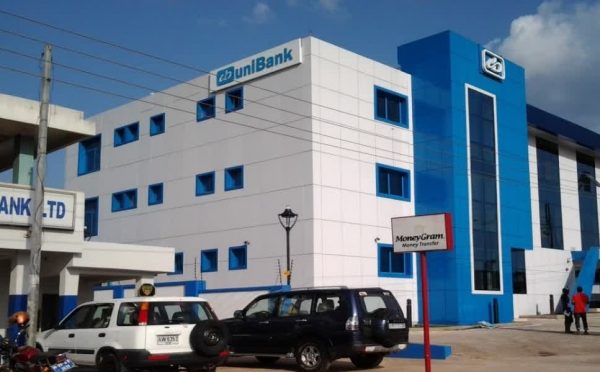The regulator says the appointment of the official administrator is aimed at saving uniBank from imminent collapse.
KPMG, as official administrator, will assume control of the bank and all its branches and carry out the responsibilities of the shareholders, directors and key management personnel of uniBank, with effect from Monday, March 20.
“It will prevent potential losses to depositors and other creditors and ensure that the financial condition of the bank does not create further risks for the entire financial system,” governor of the bank, Dr Ernest Addison told reporters yesterday during a press briefing.
KPMG will ascertain the state of the bank’s assets and liabilities, and exercise a variety of powers under Act 930 to rehabilitate and return the bank to regulatory compliance and viability within a period of six months, at the end of which the bank will be returned to private ownership and management.
uniBank breached cash reserve requirement
The troubled bank persistently suffered liquidity shortfalls and consistently breached its cash reserve requirement.
As a result, uniBank relied extensively on liquidity support to the tune of over GH¢2.2 billion from the BoG over the past two years to meet its recurring liabilities.
The governor disclosed that the BoG was exposed to the tune of nearly GH¢400 million, “as this amount was not reflected in its books.”
Depositors’ interest jeopardised
The BoG revealed that uniBank conducted its credit administration in a manner that jeopardised the interests of depositors and the financial sector as a whole.
Failure to comply with BoG directives on granting of loans
uniBank failed to comply with a directive of the Bank of Ghana in October 2017 under Section 105 of Act 930, prohibiting the bank from granting new loans and incurring new capital expenditures.
uniBank breached Section 66(1) of Act 930
The bank borrowed from the inter-bank market without the written approval of the Bank of Ghana when its Capital Adequacy Ratio (CAR) was less than the prescribed 10 per cent, in breach of section 66(1) of Act 930.
MoF agreed to absorb debts owed by govt to the bank
In spite of the Ministry of Finance recently agreeing to absorb a significant amount of the debts of government contractors owed to the bank to the tune of GH¢428,817,961 (backed by Interim Payment Certificates issued to contractors), the bank was unable to address its capital deficiency, which continued to deteriorate.
The announcement comes two weeks after uniBank announced a purported takeover of Agriculture Development Bank (ADB) after some shareholders of the latter pledged their shares in the bank.
The BoG, at the time, dismissed the reports, explaining that it had not approved any such takeover.
“During the period of official administration of uniBank, the bank will remain open for business under the management and control of KPMG, overseen by the Bank of Ghana, and is not being closed and liquidated,” he emphasised.
Dr Addison said uniBank’s problems were part of the legacy issues in the financial sector attributed to weak economic growth and poor corporate governance and risk management practices.
He said uniBank was one of nine banks identified after the asset quality review exercise, undertaken in 2016, to be significantly undercapitalised with a CAR of 4.75 per cent.
The governor said as part of efforts to recapitalise the bank, uniBank submitted capital restoration plans to the Bank of Ghana, which it implemented to build up its capital to 7.7 per cent in August 2017.
Subsequent reviews of uniBank’s books by Bank of Ghana’s supervision teams showed that the bank had not reported the state of its loan book accurately, the governor said.
Consequently, by October 2017, its CAR was estimated at negative 12.5 per cent, making it technically insolvent. By December 2017, its CAR had dropped further to negative 24 per cent.
“The bank has failed to submit its monthly returns to the Bank of Ghana for January and February 2018, and as a result, Bank of Ghana has no evidence to suggest that its CAR has been restored to the regulatory minimum of 10 per cent,” Dr Addison said.
He said efforts made by Bank of Ghana’s supervisory teams who visited the bank’s head office several times this month to obtain current information on the bank’s financial health proved futile as the bank’s management failed to co-operate with the Bank of Ghana staff on site.
The appointment of an official administrator has, therefore, become necessary due to the fact that uniBank has, among other things, persistently maintained a CAR below zero (currently negative 24 per cent, making it technically insolvent).
The bank also failed to comply with several other regulatory requirements, including lending to a number of borrowers in excess of its regulatory lending limit, borrowing from the inter-bank market without the written approval of the BoG when its CAR was less than the prescribed 10 per cent.
It also outsourced a number of services such as those of tellers, receptionists and security to affiliate companies without the prior approval by the Bank of Ghana.
It refused to co-operate with the Bank of Ghana in the performance of its supervisory responsibilities, including deliberately concealing some liabilities from its balance sheet and failing to submit documents and records for supervisory inspection.
Besides, poor corporate governance and risk management practices rendered the bank vulnerable to macroeconomic shocks.
Also, the bank engaged in significant transactions with its parent company and affiliate companies, including connected lending and other related party transactions without sufficient controls as required by law.
“Allowing the continuation of uniBank’s activities in their current form would be detrimental to the interests of depositors and the banking system as a whole,” he said.
Dr Addison reassured customers of uniBank that all deposits with uniBank are, and will remain, safe and that they can continue to do business at any of its branches.
The governor said the central bank remained committed to supporting the orderly development of Ghana’s banking sector, including indigenous Ghanaian banks, while promoting a strong and resilient sector to drive Ghana’s economic growth.











 (Selorm) |
(Selorm) |  (Nana Kwesi)
(Nana Kwesi)